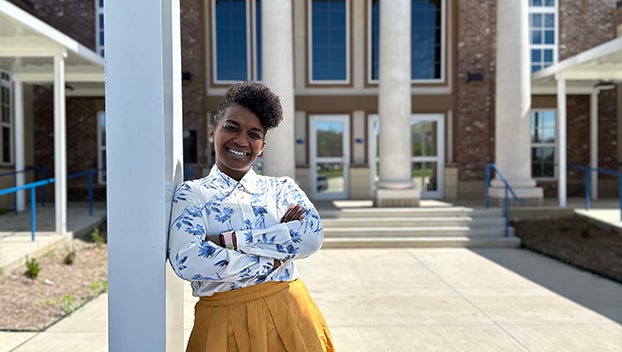Hughes: State award reflects ‘hope and perseverance’
Published 10:39 am Saturday, May 4, 2024

- Tamala Hughes was recently named Alternate State Teacher of the Year by the Mississippi Department of Education. She teaches English II at Natchez High School. (Submitted)
|
Getting your Trinity Audio player ready...
|
NATCHEZ – When Tamala Hughes was recently named Alternate State Teacher of the Year by the Mississippi Department of Education, she didn’t just win that title for herself.
It was a win for her entire community who rallied behind her through the entire process.
As Hughes stated on stage during her acceptance speech, “This award shows that a little girl from the country can travel the world, learn all she can, and come home and be recognized as (alternate) state teacher of the year. This award says to them that I can be something better, and just because it has not been done before doesn’t mean it can’t be done now. This is an award of hope and perseverance. It shows that when you do what you do from the heart, it will end in reward.”
Hughes has taught 18 years in five school districts, she said. She is a 1998 graduate of Natchez High School and moved around as a military spouse. Her husband is her high school sweetheart, retired Lt. Col. Albert Hughes. They have two children, Albert Jr. who is a sophomore at the University of Southern Mississippi, and Alaina, who is a senior at NHS and will soon be joining her brother at USM.
Love for Mississippi and their Natchez community brought them home, she said.
Hughes began her teaching career at Natchez Adams School District teaching 7th and 8th grade English Language Arts. She now teaches English II and Natchez High School.
“I originally thought I was going to be an attorney up until my senior year of high school,” she said. Her mother Ethel Scott was a teacher and retired after 31 years at NASD.
Hughes is also the daughter of the Rev. John Scott, pastor of Christian Hope Baptist Church.
Her dad is not what one might expect a Baptist preacher to be, Hughes said. He is a quiet thoughtful person and her mother, on the other hand, is an outspoken performer.
“I didn’t know teaching was my calling then. At 17, I didn’t know what a calling was. But because of those experiences — helping my mom in her classroom — and passions in other places, I went to school and majored in Secondary English Education.”
Though she technically lost the Teacher of the Year title, Hughes said becoming a finalist, much less the first runner-up, was an accomplishment that she never thought was within reach.
It wasn’t tangible until Superintendent Zandra McDonald Green called Hughes into the principal’s office one day in March. This doesn’t happen often and Hughes said she wondered what was wrong.
Standing across from Hughes with a serious look on her face, Green told to her, “Mrs. Hughes, sometimes my job requires us to have some uncomfortable conversations — but this isn’t one of them.”
Much to Hughes’ relief, the serious looks melted away and Green informed her before anyone else that she was named a finalist for Mississippi’s Second Congressional District, which is the last step before the State Teacher of the Year is selected. Only four teachers in the state are chosen as finalists.
She didn’t tell anyone until the email from MDE came, making it public. At the time, Hughes said she didn’t understand the significance.
“When the superintendent told me ‘You’re the first in our district to make it to the finalist stage’ and that to everyone’s knowledge that has never happened,” Hughes said she was forced to set aside her emotions to perform her daily teaching duties.
She received a “homework assignment,” in a packet instructing her to capture the essence of her entire teaching career in five questions.
For her snapshot she wrote an essay, then had to edit that essay into paragraphs, then down to one sentence.
“I may not be able to change the world, but if I can reach one child perhaps that child can,” Hughes said. To explain what that meant, she said, “You’re not going always have the perfect class … You’re not going to be able to heavily impact the outlook that every child has on the world and they’re not going to always be the best versions of themselves. In realizing that, maybe I can sprinkle a little bit of good right here. I might be able to, but you will one day because I showed up today. You always got to show up. Every day I come and look for the good. And there’s always some good. Some days it may seem like it’s hidden under a boulder. But when you get to it, it makes everything worthwhile.”
On March 26, she went to Jackson for the interview. Hughes said the interview process was laid back but intense.
“They hit you with these questions and it’s not necessarily rapid fire, but it is one after the other and you have five seconds to come up with a meaningful answer. You don’t prepare. You just pray and hope for the best.”
She also put together a presentation to summarize her impact as a teacher but had only five slides to do so.
Hughes said she left the interview feeling comfortable, but the result wouldn’t come out until a month later.
“That gave me exactly one month to agonize over this,” she said. “I couldn’t sleep. Throughout this entire process, what stood out to me the most was not what State Teacher of the Year meant for me. It was what it meant for Natchez. What this means for my students because they were excited.”
Hughes said the entire community rallied behind her, not just family. People she didn’t know stopped her in the grocery store to congratulate her on being a finalist and to wish her luck. Mayor Dan Gibson stopped her to ask, “When do ‘we’ find out?”
Hughes’ students encouraged her too, saying “Mrs. Hughes You got this,” she said.
Hughes said what stood out to her most through the entire process from the principal’s office to the grand stage was this support from her community.
“To have my students feel proud of something — because they’re not always on winning teams — that they could look at me and I give them something to strive for, to make them say ‘I can be something bigger than I am’ makes it real. That’s what made me want it more. The $500 stipend and degree from William Carey were perfectly wonderful incentives. But the outpouring of love and support from my community meant more to me.”
Each of the finalists wrote their acceptance speech and hoped that they get to use it.
Hughes said she wrote hers twice, the first time on her tablet and the second time on note cards she could slip in a pocket because she couldn’t bring the tablet on stage with her.
“In this very moment, I am reminded of a song that says, ‘I am who I am today because God used my mistakes. It was necessary,’” she said. “I am not a perfect teacher, not part of a perfect profession, and certainly not living in a perfect world. However, each and every decision made prior to this moment brought me to this moment. So, I thank God for allowing me to be present in this moment. …
“I do not accept this title for myself. I accept this award on behalf of the many teachers I’ve worked alongside who have never and may never receive the recognition they deserve. This award is for the first-year teacher who has been met with hardships in classrooms and PLCs across the state, the veteran teacher who has lost her passion due to politics, parents, and a lack of resources and administrative support.
“I share this award with the retired teacher who will not know what it feels like to stand in a room full of your peers and be acknowledged for the late nights, long days, and lengthy meetings we all know could have been emails. I share this award with all support staff who every day shield us from disruptions to instruction, who get the kids to us—and sometimes thankfully take them away from us—to the nourishers of all of us, those who disinfect and prepare our classrooms, those who protect us.
“More importantly, this award is for the students — not just my students, but for all of the little boys and girls who don’t see the greatness that hails from the grand state we know as Mississippi and the ‘small town with the heart of the biggest cities,’ Natchez.”





